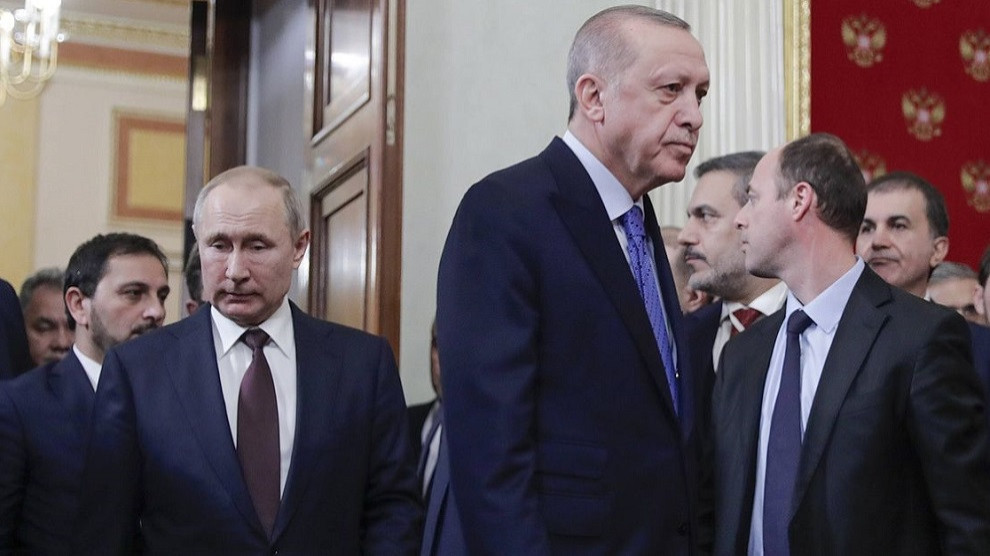Erdogan's diplomatic defeats
The war in Idlib is inevitable despite negotiated breathing space. If Erdogan had been promised the desired support in Brussels, he could have started the war without waiting for an attack by the Syrian army.
The war in Idlib is inevitable despite negotiated breathing space. If Erdogan had been promised the desired support in Brussels, he could have started the war without waiting for an attack by the Syrian army.

Turkish President Recep Tayyip Erdogan visited Moscow on 5th March with a high-level delegation. A few days later, Russian state television published footage showing Turkish guests waiting for minutes at Putin's door. The video show the conditions under which the visit took place. Apparently Erdogan no longer holds any cards of diplomatic and political value.
Ne görüntüler varmış.
— Amed Dicle (@ameddicleT) March 8, 2020
Putin'le görüşmeye giden Erdoğan ve heyetinin Kremlin koridorlarindaki beklentişleri.. pic.twitter.com/F9hcRsYXPd
After a total of five hours and forty minutes of talks, a statement consisting of three paragraphs was published. In the Erdogan-ruled media, the declaration was portrayed as a "victory". The Turkish side spoke of a cease-fire and the securing of the observation posts in Idlib. The Russian side, on the other hand, pointed out that no ceasefire had been negotiated, but that "military activities had been temporarily suspended".
Erdogan's problem is not only Idlib, but rather the Russian plan to expel Turkey step by step from the occupied territories of Afrin, Azaz, al-Bab and Jarablus and to return the entire region to the Syrian government. Because Erdogan knows this, he has declared war in Idlib. His dreams are buried there for the time being.
Less than a week after the meeting in Moscow, observers assume that not only Idlib was discussed, but also the Kurds in Rojava. One theory is that Erdogan has called on Putin to stop the Kurds in Syria, because otherwise a process will begin that could lead to the division of Turkey. This thesis is supported by the Turkish occupation attacks in all parts of Kurdistan.
After his visit to Russia, Erdogan travelled to Brussels. These talks are said to have dealt with similar issues. The fact that Erdogan left again before the planned joint press conference suggests that he did not receive the desired support against the Kurds. For him, it is still a matter of occupying and annexing the Kurdish territories and preventing the Kurds from gaining political status at all costs.
Iran, as the third guarantor power in Syria, has been excluded from the two-party talks between Erdogan and Putin about Idlib. Former Iranian Foreign Minister Kamal Kharazi and his entourage blame President Hassan Rouhani, who has coordinated his Syria policy with Russia and Turkey, for this. Kharazi was foreign minister between 1997 and 2005 and is considered a leading figure among reformists.
At the moment the situation in Idlib is somewhat calmer. Turkey and Russia are already accusing each other of breaking the "ceasefire" or "suspension of military activities" negotiated in Moscow and of attacks. Meanwhile, Turkey continues its troop deployment to Idlib. Iran also continues to be active in the region. Numerous Arab media report on relocations of the pro-Iranian Hezbollah to the vicinity of Idlib. The Syrian army is also concentrating more troops in the region. Russia is merely observing the developments that are taking place. The concentration of various forces in the region suggests that the fighting will resume with a high potential for violence once the breathing space negotiated in Moscow has expired. Presumably, Iran, which is excluded in Moscow, will want to assert its existence by intensifying its efforts on the ground. This is what the preparations indicate. They also show that the war against the Syrian army and government, proclaimed by Turkey under the name "Spring Shield", will begin very soon.
It appears that in the event of renewed fighting, Iran will play an active role in this process with the forces under its control and its close units within the Syrian army. Russia participated in the fighting with air support before the meeting in Moscow. The meeting with the Turkish delegation in Moscow indicates that Russia will also take a more active position in the event of renewed fighting.
If Erdogan had been promised the desired support in Brussels, he could have started the war without waiting for an attack by pro-Iranian forces and the Syrian army. But no matter from which side the starting signal is given, this war seems inevitable, because Erdogan's fate depends on it. He has lost this war from the beginning and has nevertheless considered it, because a withdrawal from Idlib without a fight would have meant the loss of power for him.
This war is also decisive for the fate of the Kurds and the autonomous region of north-east Syria. Should Erdogan, contrary to expectations, win the war and declare another part of Syria an occupation zone, he would make a step forward in the implementation of his neo-Ottoman expansion plans. This war therefore determines the fate of all peoples and religious communities living in Syria.
RELATED NEWS: